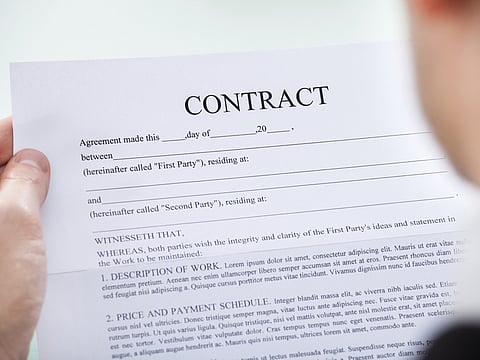How to resign from your job without any legal problems in the UAE
Resignations are tough sometimes, but you have rights that you need to know

Also In This Package
Dubai: It’s time to move on from the job you currently have. Whether you are unhappy or have found a new opportunity, no guilt should be associated with seeking a better position, a bigger pay-cheque or a more satisfactory role.
Here’s what you need to keep in mind.
Before you make it official, know your rights
Make sure you dig out your employment contract and read it very carefully. It should contain details of your compensation, gratuity, air passage, etc.
Make sure you're not in violation of any confidentiality agreements you've signed with your current employer.
1. You do not need your employers' consent
The Labour Law does not require the consent of the employer for resigning from a job. This is your own decision to make. You cannot be forced to resign either.
2. Plan ahead: Your notice period is mandatory
You have to keep in mind that for all labour contracts, the notice period mentioned in the contract is compulsory as it has been agreed between the employer and employee. When an employee resigns, they are obliged to serve the notice or pay a compensatory amount, unless he or she has a written statement from the employer waiving the notice period for whatever reason. It is usually no less than 30 days.
What happens if you leave without serving your notice period?
You can be banned from working in the UAE for a period of up to one year.
3. Make sure to leave courteously
Leaving on good terms is the best way to go. Even if your relationship with your boss isn’t great. Make sure you maintain a high level of courtesy when you resign by selecting the right timing, manner and language. It is always advisable not to let your co-workers know your decision to quit until you have formally informed your boss or the human resources department.
4. Write out your resignation letter
Have a written resignation letter that states your motives for wanting to leave your job. Your boss needs this for paperwork purposes. Submitting resignation through email is also acceptable by law.
5. Be prepared for a negotiation
If you’ve really made up your mind, then don’t negotiate unless you're willing to accept a counter-offer. Otherwise be clear that your decision is final and no offer can change your mind.
Many people use resignations as a way to negotiate a better position or pay, or in other words to force an employer to make a counter-offer. However, this is a risky attempt. A counter-offer is never guaranteed and it will greatly undermine your credibility if you seem shaky about your resignation.
6. Calculate your gratuity
Calculating your end-of-service (gratuity) pay is important. Knowing how the total sum is reached will help you identify any errors made by your company.
Gratuity pay is calculated based on the most recent salary paid into your account without allowances and/or bonuses. It can be different depending on whether your contract was limited or unlimited.
A limited or fixed term contract is where the employee agrees to stay with the company for a certain number of years with a set end date. Resigning before the end of this period could mean one or all of these; a labour ban, loss of labour rights or even payment of compensation to the employer.
An unlimited contract has no such period clause or number of years, and therefore, has no end date. However, a notice period of one to three months is applicable for termination of contract from either side.
How much will you get?
Less than 1 year of service
Leaving work before completing one (1) year of service means that you are not entitled to any gratuity pay.
Between 1 year and 3 years of service
Employee is entitled to one third (1/3) of the 21-days gratuity pay.
Between 3 years and 5 years of service
Employee is entitled to two thirds (2/3) of the 21-days gratuity pay.
5 or more years of service
Employee is entitled to full 21-days gratuity pay.
7. Moving on
Once you’ve completed all the paperwork, be professional and don't burn any bridges. Sometimes, things might be awkward while you’re serving your notice period. Just maintain your professionalism.
Your employer also cannot prohibit you from working in another company or any industry after you have resigned and served your notice period. You are free.
8. Keep in touch
It's always nice to reach out every once in a while to stay in touch and make sure you are on good terms with your previous company. You never know at any point in your life when you may need someone's help there.
-Gulf News is not responsible for any amendments made to the UAE Labour Law. All labour disputes must go through the Ministry of Labour. This article may only be used as a guide.
Sign up for the Daily Briefing
Get the latest news and updates straight to your inbox




